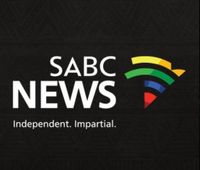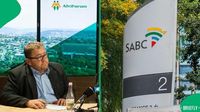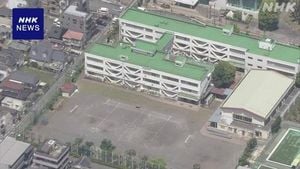In a surprising move that has sparked outrage among Afrikaans speakers, the South African Broadcasting Corporation (SABC) failed to air its scheduled Afrikaans news bulletin on April 5, 2025. This abrupt cancellation has prompted both AfriForum and the Democratic Alliance (DA) to demand answers from the state broadcaster, raising concerns over the implications for language representation in South African media.
The Afrikaans news segment, which was supposed to air at 18:15 on SABC 2, was notably absent without any prior notice or explanation. This lack of communication has left many viewers puzzled and frustrated, leading the DA to label the situation as "troubling." DA spokesperson Willie Aucamp emphasized the need for immediate clarification on whether this decision represents a permanent change or if it was merely a one-off incident. "We will write to the SABC to request urgent answers regarding this matter, and we call on the SABC to restore the Afrikaans news bulletin as soon as possible," Aucamp stated.
AfriForum, a prominent lobby group advocating for Afrikaans interests, has also expressed its discontent. The organization sent a letter to the chairperson of the SABC, demanding an explanation for the cancellation. Alana Bailey, AfriForum’s Head of Cultural Affairs, pointed out that this is not the first time concerns have been raised about the Afrikaans news segment. In August 2024, AfriForum had already highlighted issues regarding the rescheduling or replacement of Afrikaans news with other programming, such as sports.
Bailey remarked, "The institution has constantly been struggling with budget shortfalls in recent years, and it is therefore incomprehensible that Afrikaans news, which according to our information is a key source of advertising revenue, is subject to fluctuations and omissions of this nature without explanation." She further noted that approximately a third of the market identifies as Afrikaans, making the decision to exclude this demographic from news coverage particularly perplexing. "It is choosing to kill a proverbial goose that is laying golden eggs," she added.
The DA's call for answers comes amid concerns that the SABC is neglecting its duty as a public broadcaster to serve all language communities. Aucamp highlighted that the Afrikaans news bulletin caters to over 300,000 viewers who pay for their TV licenses, and he criticized the SABC for showing indifference towards such a significant segment of the population. "The SABC cannot suddenly stop airing the Afrikaans news bulletin without notice or justification," he said.
Social media reactions to the situation have been mixed, with some users mocking the absence of the Afrikaans news by suggesting that the Afrikaans community is emigrating to the United States and no longer needs local news coverage. Comments like, "We thought they are already leaving, hence, there was no point to broadcast the news in their language," reflect a blend of humor and frustration among South Africans.
Others pointed out the broader implications of the SABC's programming choices, noting discrepancies in airtime allocations for different languages. For instance, Sesotho, Setswana, and Sepedi news segments are reportedly given only 15 minutes on weekends, while Nguni languages receive 30 minutes. This disparity has raised questions about equitable representation in South African media.
In the wake of this controversy, AfriForum and the DA have reiterated the importance of maintaining access to news in Afrikaans, which they argue is essential for cultural preservation and representation. Bailey underscored that access to vital information in one of the official languages of the country is a fundamental reason for the SABC's existence.
As the situation unfolds, both AfriForum and the DA are poised to continue pressing the SABC for answers. The outcome of this inquiry may have lasting implications for language representation in South African media and the future of broadcasting in the country.
In a broader context, the SABC's decision to halt the Afrikaans news segment raises critical questions about media accessibility and the responsibilities of public broadcasters in a multilingual society. As South Africa continues to navigate its diverse cultural landscape, the need for inclusive media representation remains paramount.






